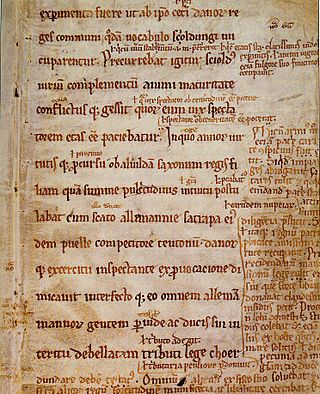
Gesta Danorum is a patriotic work of Danish history, by the 12th-century author Saxo Grammaticus. It is the most ambitious literary undertaking of medieval Denmark and is an essential source for the nation's early history. It is also one of the oldest known written documents about the history of Estonia and Latvia.
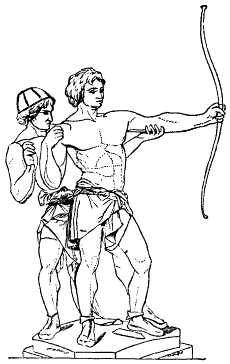
Höðr is a god in Norse mythology. The blind son of Odin and Frigg, he is tricked and guided by Loki into shooting a mistletoe arrow which was to slay the otherwise invulnerable Baldr.
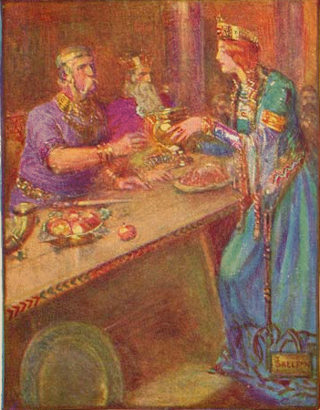
Hrothgar was a semi-legendary Danish king living around the early sixth century AD.
Fróði is the name of a number of legendary Danish kings in various texts including Beowulf, Snorri Sturluson's Prose Edda and his Ynglinga saga, Saxo Grammaticus' Gesta Danorum, and the Grottasöngr. A Danish king by this name also appears as a minor character in the Middle High German epic Rabenschlacht. The name is possibly an eponym for the god Freyr.

The Ynglings were a dynasty of kings, first in Sweden and later in Norway, primarily attested through the poem Ynglingatal. The dynasty also appears as Scylfings in Beowulf. When Beowulf and Ynglingatal were composed sometime in the eighth to tenth centuries, the respective scop and skald (poet) expected his audience to have a great deal of background information about these kings, which is shown in the allusiveness of the references.
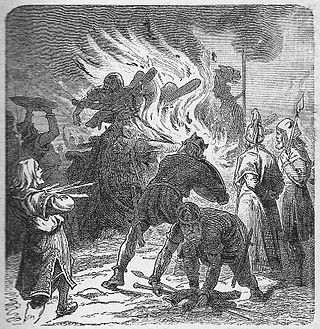
Sigurd Ring according to legend was a king of the Swedes, being mentioned in many old Scandinavian sagas. According to these sources he was granted rulership over Sweden as a vassal king under his uncle Harald Wartooth. Later he would take up arms against his uncle Harald in a bid to overthrow him and take the crown of Denmark, a conflict which Sigurd eventually won after the legendary Battle of the Brávellir, where it is said that Odin himself intervened and killed Harald. In the Sagas, Sigurd is also known for being the father of the Norse Viking hero and legendary king of Denmark and Sweden, Ragnar Lodbrok. According to Bósa saga ok Herrauds, there was once a saga on Sigurd Ring, but this saga is now lost.

Halfdan was a late 5th and early 6th century legendary Danish king of the Scylding (Skjöldung) lineage, the son of king named Fróði in many accounts, noted mainly as the father to the two kings who succeeded him in the rule of Denmark, kings named Hroðgar and Halga in the Old English poem Beowulf and named Hróar and Helgi in Old Norse accounts.

Halga, Helgi, Helghe or Helgo was a legendary Danish king living in the early 6th century. His name would in his own language (Proto-Norse) have been *Hailaga.

The Battle of Brávellir or the Battle of Bråvalla was a legendary battle, said to have taken place c.770, that is described in the sagas as taking place on the Brávellir between Sigurd Hring, king of Sweden and the Geats of Västergötland, and his uncle Harald Wartooth, king of Denmark and the Geats of Östergötland.
Heremod is a legendary Danish king and a legendary king of the Angles who would have lived in the 2nd century and known through a short account of his exile in the Old English poem Beowulf and from appearances in some genealogies as the father of Scyld. He may be the same as one of the personages named Hermóðr in Old Norse sources. Heremod may also be identical to Lother in Saxo Grammaticus' Gesta Danorum or the same history may have been applied to two originally separate figures.
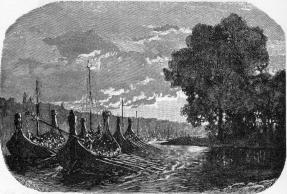
The Wulfings, Wylfings or Ylfings was a powerful clan in Beowulf, Widsith and in the Norse sagas. While the poet of Beowulf does not locate the Wulfings geographically, Scandinavian sources define the Ylfings as the ruling clan of the Eastern Geats.
In Norse mythology, Snær is seemingly a personification of snow, appearing in extant text as an euhemerized legendary Scandinavian king.
Raum the Old is a legendary king in Norway in the Hversu Noregr byggdist and in Thorsteins saga Víkingssonar. He was said to have been ugly, as was his daughter, Bryngerd, who was married to King Álf. Indeed, in Old Norse, raumr means a big and ugly person.

Helgi Hundingsbane is a hero in Norse sagas. Helgi appears in Volsunga saga and in two lays in the Poetic Edda named Helgakviða Hundingsbana I and Helgakviða Hundingsbana II. The Poetic Edda relates that Helgi and his mistress Sigrún were Helgi Hjörvarðsson and Sváva of the Helgakviða Hjörvarðssonar reborn. They were once again reborn as Helgi Haddingjaskati and Kára whose story survives as a part of the Hrómundar saga Gripssonar.
Hámundr is a minor character in Norse mythology.
In Norse mythology, Nanna Nepsdóttir or simply Nanna is a goddess associated with the god Baldr. Accounts of Nanna vary greatly by source. In the Prose Edda, written in the 13th century by Snorri Sturluson, Nanna is the wife of Baldr and the couple produced a son, the god Forseti.
Ásmundar saga kappabana is the saga of Asmund the Champion-Killer, a legendary saga from Iceland, first attested in the manuscript Stockholm, Royal Library, Holm. 7, 4to, from the first half of the fourteenth century. It is essentially an adaptation of the German Hildebrandslied, but it has assimilated matter from the Tyrfing Cycle.
The dog king is a Scandinavian tradition which appears in several Scandinavian sources: Chronicon Lethrense, Annals of Lund, Gesta Danorum, Heimskringla, Hversu Noregr byggðist and probably also in Skáldatal.

The Haddingjar refers on the one hand to Germanic heroic legends about two brothers by this name, and on the other hand to possibly related legends based on the Hasdingi, the royal dynasty of the Vandals. The accounts vary greatly.
Hrœrekr Ringslinger or Ringscatterer was a legendary 7th-century king of Zealand or Denmark, who appears in Chronicon Lethrense, Annals of Lund, Gesta Danorum, Sögubrot, Njáls saga, Hversu Noregr byggðist, Skjöldunga saga, and Bjarkarímur. Connection with such historical figures such as Horik I, who ruled Denmark around 854 for a dozen or so years, or the founder of the Rurik dynasty is fraught with difficulty.










